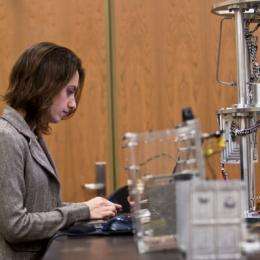UCF students to experience free-fall for physics experiment

(PhysOrg.com) -- A team of current, past and future University of Central Florida students will float around in weightlessness like astronauts this month as part of a physics experiment that could provide valuable information for future trips to the Moon or asteroids.
UCF Associate Professor Josh Colwell is leading a team of students on a Zero-G flight on a specially modified Boeing 727 on Nov. 20. The students will be manning several experiments during the flight, which departs from Titusville municipal airport at 10 a.m.
Zero-G is providing the special plane. It will conduct parabolic maneuvers that achieve weightlessness. Specially trained pilots fly these maneuvers at between 24,000 and 34,000 feet altitude. The weightlessness is exactly what astronauts experience in space.
“Experiencing a zero-gravity environment is a once in a lifetime opportunity that most people only dream about,” said Amanda Stevenson, who will be on the flight. Stevenson is a recent UCF graduate with degrees in physics and aerospace engineering. “I hope that by experiencing microgravity first-hand, our team will gain a better understanding and appreciation for this unique environment, enabling improved research, experiments and techniques.”
The goal of the eight experiments is two-fold.
“We want to know how the surface of an asteroid or the Moon respond to the kinds of impacts that result from manned or unmanned spacecraft activity to better know how to manage dust hazards during future explorations of the Moon or asteroids,” said Colwell, who specializes in how the solar system formed and is an expert on Saturn’s rings.
The team also is looking to see what kind of collisions lead to sticking and what kind of collisions lead to erosion so that we can better understand the conditions that allow for the growth of “planetesimals,” the small precursors to planets.
Another experiment the team is calling “The Little Bang” aims to collect data about the early stages of planet formation.
The students who will be flying with Colwell have been configuring and modifying the equipment needed to run the experiments at a lab at UCF’s Orlando campus.
The box that contains all the necessary ingredients for the experiments is referred to as PRIME (Physics of Regolith Impacts in Microgravity Experiment). It was flown in 2001-2003, but was bolted to the plane during the zero gravity flights, which affected the quality of the data collected at the time.
Students have tweaked the box so it can fly freely to more accurately represent what happens in space. The team also upgraded a video camera to capture all the action inside the box during the flight.
Engineer and UCF graduate Nico Brown, of West Palm Beach; Laura Seward, a graduate student working on a Ph.D. in physics; and Mackenzie Campbell, of Lake Wales, a UCF undergraduate working on a degree in mechanical engineering will join Stevenson on the flight.
The final flier is Hunter Nagler, of Winter Park, who is a Valencia Community College student. He plans to transfer to UCF next year through the Direct Connect program with an AA degree already in hand. He will work toward degrees in mechanical and aerospace engineering once at UCF. He heard about Colwell’s work through a family member and began working in the lab this past summer.
“I’m excited,” Nagler said. “It means I have the opportunity and privilege to be involved in real-world research that actually matters. Not for a science fair, not for a lab project to get a grade, but actual research that will hold a bearing on the universe we live in and how we come to understand certain aspects of it.”
There’s also the thrill of what amounts to the world’s largest roller coaster.
“The weightless environment means I get to float around like an astronaut, and I don’t think I’ve ever met someone who hasn’t dreamed about being an astronaut at some point,” he said.
The experiment is one of several being conduced out of UCF’s Microgravity Center. The center’s goal is to establish Florida as an international center for microgravity research, a new area with plenty of economic opportunities. Microgravity is the state of free fall or weightlessness.
Provided by University of Central Florida



















